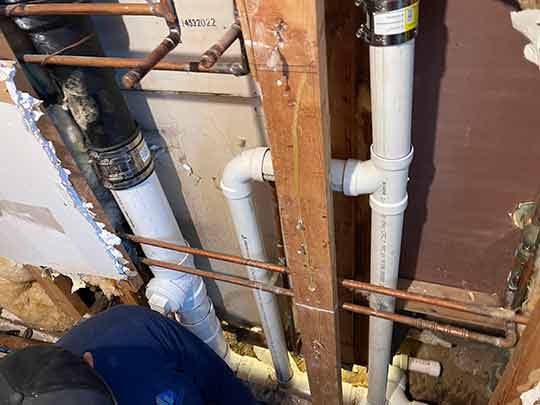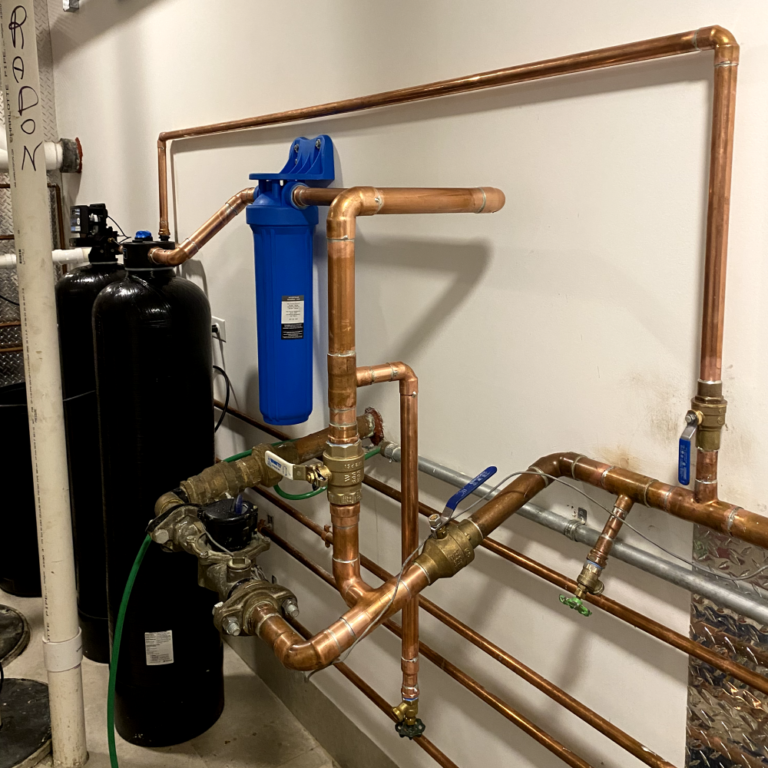Houston Repipe jobs completed with professionalism
Why Buying Repiping Providers Is Vital for Your Home's Pipes Health and wellness
Repiping services play a crucial duty in maintaining a home's plumbing health. With time, pipes can rust, leakage, or become clogged up, causing potential dangers and inefficiencies. House owners frequently forget the signs of wearing away pipes, which can cause considerable damages. Recognizing the need for repiping is important. What variables should house owners take into consideration prior to making this financial investment? The answers may shock you.
Recognizing the Importance of Repiping
While numerous property owners may forget the value of repiping, it plays a vital role in keeping the total wellness of a plumbing system. In time, pipelines can wear away, create leakages, or come to be blocked with mineral down payments, bring about reduced water top quality and circulation stress. Repiping addresses these issues by replacing old, broken pipelines with brand-new, durable products, ensuring a dependable water system and lowering the threat of expensive repair services connected with leakages and water damage. Additionally, modern piping products are typically extra environmentally friendly and efficient, contributing to lower power costs and improved water conservation. Performing a repiping task can improve a home's resale worth, making it a sensible investment for house owners. Ultimately, acknowledging the significance of repiping allows homeowners to take aggressive steps in safeguarding their plumbing systems and ensuring a risk-free, useful living environment for their family members.
Typical Indicators That Suggest the Requirement for Repiping
Homeowners should be watchful for certain indications that show the need for repiping, as overlooking these concerns can result in much more extreme plumbing problems. One typical indicator is the existence of constant leakages, which can recommend aging or degrading pipelines. Furthermore, a recognizable decrease in water pressure may indicate clogs or deterioration within the plumbing system. Property owners might additionally see discolored or corroded water, signaling pipe deterioration. Unexplained water costs that are significantly greater than usual can additionally mean leakages concealed within the wall surfaces. Moreover, the development of mold or mold in areas near plumbing fixtures can recommend dampness concerns originating from harmed pipelines. If the home has old galvanized piping, it might be time to assume about repiping, as this material is vulnerable to corrosion and deterioration. Acknowledging these signs early can help maintain a healthy plumbing system.
The Threats of Ignoring Pipes Issues
Overlooking plumbing problems can cause significant water damages, which may compromise the architectural integrity of a home. Additionally, unsolved leakages can create an atmosphere for mold and mildew growth, presenting major health and wellness hazards to passengers. Resolving plumbing issues promptly is necessary to guard both home and well-being.
Water Damages Issues
When pipes issues go unaddressed, the risk of water damages escalates considerably. Leaks, trickles, and fractures in pipelines can cause substantial water intrusion, endangering the structural integrity of a home. With time, also minor leaks can trigger rot, mold and mildew development, and damages to wall surfaces and floor covering, causing expensive fixings. Water damage can likewise impact electric systems, producing harmful conditions. House owners frequently undervalue the cumulative impact of small leakages, which can lead to extensive damages if not without delay attended to. Neglecting pipes problems not just enhances the likelihood of prompt damage but can also diminish building worth and position long-term monetary burdens. Because of this, prompt repiping services are crucial to stop water damage and preserve a healthy home atmosphere.
Wellness Hazards Rise
Unresolved plumbing concerns can cause substantial health hazards within a home. Contaminated water from corroded pipelines can lead and introduce unsafe microorganisms to severe diseases. Mold and mildew development, commonly an outcome of leaks and excess wetness, presents respiratory system dangers and can activate allergies. Furthermore, stagnant water can attract insects such as rats and pests, which carry diseases that even more jeopardize family wellness. Ignoring these plumbing problems not only jeopardizes the security of citizens yet can additionally diminish building worth. Addressing plumbing issues through repiping solutions is important. Prompt intervention not just safeguards wellness yet additionally assures a secure living environment, avoiding much more comprehensive damage and costly repair services down the line.
Various Kinds Of Piping Products
Piping materials are a necessary part in plumbing systems, affecting durability, efficiency, and total performance. Numerous options are readily available, each with one-of-a-kind buildings and applications. Copper piping is understood for its durability and resistance to deterioration, making it a prominent choice for both chilly and warm water lines. PVC (polyvinyl chloride) is lightweight, affordable, and resistant to chemical damages, mostly utilized for drain and air vent systems. PEX (cross-linked polyethylene) has obtained popularity as a result of its flexibility and ease of setup, permitting less joints and potential leak factors. Galvanized steel, though when usual, is less favorable today as a result of its vulnerability to corrosion and decreased water circulation over time. Each material presents unique advantages and disadvantages, making it crucial for homeowners to speak with pipes professionals to figure out the most appropriate choice for their certain demands and conditions. Choosing the ideal piping product can significantly impact the effectiveness and safety and security of a plumbing system.
The Repiping Process: What to Expect
The repiping procedure starts with an extensive analysis of the existing pipelines to recognize concerns and determine the finest program of activity. Following this examination, property owners will require to choose appropriate replacement products that fit their plumbing needs. An introduction of the installment procedure will certainly offer insights into what to expect during this considerable home renovation.
Analysis of Existing Pipelines
An exact analysis of existing pipelines is vital for making sure the lasting wellness of a pipes system. This examination includes examining the products, age, and problem of the pipelines, along with recognizing any kind of signs of rust, leaks, or blockages - repipe specialist in houston. Specialist plumbers typically use sophisticated techniques such as video examinations to get a clear sight of the pipe's interior without intrusive treatments. By recognizing issue locations early, property owners can prevent further damage and expensive repair services in the future. Additionally, understanding the present state of the plumbing framework help in making educated decisions relating to necessary upgrades or repiping. Generally, a complete assessment functions as the structure for a successful repiping procedure, making certain that the brand-new system meets the home's certain needs
Selecting Substitute Products
After assessing the existing pipes, home owners encounter the essential choice of choosing proper substitute materials for their plumbing system. Common choices consist of copper, PVC, PEX, and CPVC, each with distinctive advantages and downsides. Copper is recognized for its longevity and resistance to deterioration, making it a resilient choice. PVC is light-weight leaky faucet repair and cost-effective, suitable for drainpipe and air vent lines. PEX provides flexibility and is resistant to range and chlorine, making installment easier in tight areas. CPVC is similar to PVC however can stand up to greater temperatures. Property owners need to think about variables such as spending plan, local structure codes, and the certain demands of their pipes system when making this choice, ensuring suitable efficiency and durability for their home's plumbing infrastructure.
Installation Process Summary
Repiping a home can be a considerable endeavor, but understanding the installation process aids homeowners plan for what exists ahead. The process generally starts with a comprehensive assessment of the existing pipes system to recognize problem areas. Next, a detailed strategy is created, detailing the needed products and timelines. On the setup day, experts will certainly frequently start by turning off the supply of water and draining the existing pipes. They then remove the old piping, which might include opening up walls or ceilings for access. Brand-new pipes are mounted, ensuring they meet current pipes codes. Finally, the system is evaluated for leaks, and any type of openings are repaired. Property owners can anticipate a clean and efficient process, decreasing disturbance to their day-to-days live.
Long-Term Perks of Repiping Your Home
While several home owners may ignore the relevance of updating their plumbing, the lasting benefits of repiping a home can greatly boost both its value and functionality. One of the main advantages is improved water top quality. Older pipelines may harbor pollutants and rust, while brand-new piping guarantees safe and clean water delivery. Furthermore, repiping can cause boosted water stress, making day-to-day jobs more efficient.

How to Pick the Right Plumbing Solution for Repiping
Exactly how can homeowners ensure they select the most effective pipes service for repiping? First, they need to research local pipes companies, focusing on those that focus on repiping services. Reviewing online reviews and endorsements can provide understandings into the high quality of solution supplied. It's necessary to look for proper licensing and insurance coverage, guaranteeing the picked company complies with neighborhood policies
Home owners ought to additionally ask for thorough price quotes from numerous providers to compare pricing and services offered. Involving straight with prospective plumbing professionals can aid evaluate their expertise, interaction abilities, and determination to address inquiries. In addition, requesting for references from previous clients can confirm a firm's reliability and craftsmanship.
Ultimately, property owners must take into consideration the company's service warranty policies on materials and labor, as this can show their dedication to quality. By complying with these guidelines, home owners can get more info make an educated option, securing their pipes health and wellness through effective repiping solutions.
Often Asked Concerns
How much time Does a Normal Repiping Project Require To Complete?
A normal repiping task usually takes in between one to 5 days to complete, depending on the dimension of the home and complexity of the pipes system. Correct preparation and professional knowledge can affect total duration significantly.
Will Repiping Increase My Home's Resale Value?
Repiping often boosts a home's resale value, as possible buyers value upgraded plumbing systems. This renovation lowers prospective pipes issues, making the property more attractive and possibly warranting a higher asking price throughout sale negotiations.
Can I Stay in My Home Throughout Repiping?
Throughout repiping, staying in the home is often feasible, however it may rely on the extent of the work. Property owners should plan for momentary interruptions and consult with professionals for specific setups and security factors to consider.
What Is the Typical Cost of Repiping a Home?
The typical cost of repiping a home usually varies from $4,000 to $15,000, relying on variables such as the size of the residence, products made use of, and labor prices connected with the pipes work. - repipe specialist in houston
Do I Need a Permit for Repiping Services?
An authorization is typically needed for repiping solutions, as it assures conformity with regional building regulations and regulations. Home owners should consult their neighborhood authority or an accredited plumbing professional to establish certain permitting requirements for their area.
